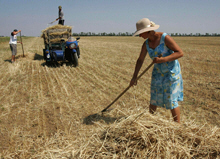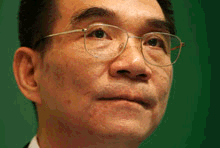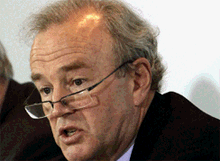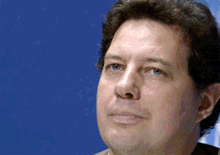
Typical street scene in Santa Ana, El Salvador. (Photo: iStock)
IMF Survey: Economic Crises Hit Workers Hardest, Labor Conference Told
January 16, 2009
- Current global crisis translating into negative shock to demand for labor
- Fiscal stimulus needs to focus on social protection of most vulnerable groups
- Rapid policy responses so far by governments could limit slowdown costs
Workers, farmers, and the poor are likely to be among the groups worst affected by the current global recession, an IMF and World Bank meeting with global labor unions heard.

Low-income laborers and women workers more likely to actually spend extra money they get, labor meeting told (photo: Gleb Garanich/Reuters)
IMF AND GLOBAL LABOR UNIONS
The poor were also likeliest to spend any extra liquidity that came their way, the meeting was told.
Four days of High-Level Meetings between the International Trade Union Confederation (ITUC) and Global Unions Group and its constituent unions—including representatives from more than 40 countries—and the IMF and World Bank in Washington, D.C., involved more than 100 visiting delegates. Labor representatives also met with the IMF Executive Board, the first time they had done so on a bilateral basis, as well as IMF Managing Director Dominique Strauss-Kahn and World Bank President Robert Zoellick.
Expanded dialogue
The IMF has rapidly expanded its dialogue with unions in recent years. More than 70 percent of country teams consult with national unions, and bilateral consultations with the ITUC take place on a regular basis.
At a January 14 conference session on the global financial crisis, World Bank Chief Economist Justin Lin said governments using fiscal stimulus to combat the effects of the global economic crisis need to focus the boost on social protection.

Lin: governments using fiscal stimulus to combat effects of global economic crisis need to focus boost on social protection (photo: Tse Ka Yin/EyePress News)
Every time there was an economic crisis, workers, farmers, and poor people were hurt the most, Lin said. Without some kind of social protection of these groups, they would suffer damage that could not be reversed later. Past crises had shown that the impact of the current global crisis would translate into a negative shock to the demand for labor, and hence to wages and employment in developing countries.
The IMF is expected to revise downward its forecast for global growth in 2009 when it publishes its latest numbers on January 29.
Second-round impacts
Lin told the meeting that the global financial crisis would affect developing countries through "second-round" or indirect impacts, through four main channels.
• Exports—if international trade contracts as forecast by more than 2 percent in 2009, developing countries would face a big drop in their overseas sales
• Capital flows—which totaled 1 trillion dollars to developing countries in 2007 but would likely halve this year
• Remittances—which reached $280 billion last year, or about three times the level of development aid, but are also under pressure from the global economic slowdown, and
• Official aid flows—which are likely to be affected by tighter budgets in advanced countries.
Lin also stressed that fiscal stimulus should be concentrated in areas that enhance the economy's growth potential so that increased fiscal spending today could be covered by high fiscal revenues without requiring higher taxes in the future, he stated.
Lin said there were two particular areas where fiscal stimulus could be focused to meet these guidelines.
• Improvement of human capital—specifically, by increasing the resources allocated to education, and
• Infrastructure spending—which would ease growth bottlenecks and help augment tax revenues to cover the cost of the initial fiscal spending in the future.
John Evans, General Secretary of the Trade Union Advisory Committee to the Organization for Economic Cooperation and Development, said global unions had become more worried about the general economic outlook since they issued a statement to the November 2008 G-20 crisis summit in Washington.

Evans: global unions had agreed on need to target fiscal stimulus on areas of spending that have biggest multipliers (photo: Peer Grimm/Newscom)
"At the moment, we're not seeing the 2 percent of GDP [the level, in percent of global GDP, of fiscal stimulus suggested by the IMF] on the table—or even more that's likely needed—to try to protect the real economy. So on the issues we raised in the G-20 statement, we're more worried rather than less," Evans said.
Biggest multipliers
Global unions had agreed on the need to target fiscal stimulus on areas of spending that have the biggest multipliers, Evans stated. "We are certainly skeptical about generalized tax cuts ... we think money has to be targeted on infrastructure projects and on efforts that create jobs."
"We also think there is a crucial need to try and protect those who are the most vulnerable in this situation—and who are more likely to actually spend money that goes into their pockets." These categories would include low-income workers and women workers. "Why not put money straight into the hands of women who will spend it ... rather than just overall tax cuts?" Evans asked.

Bayoumi: policy response to crisis by many governments had been rapid, which would help limit economic costs of slowdown (IMF file photo)
Global unions see a central role in trying to keep workforces together in the current crisis, Evans said. "We need to try to ensure that workers are trained and re-trained and have skills that can be used in [economic] recovery areas."
Turning to pay levels, Evans said "Now is not the time to be looking at wage moderation or wage cuts. How do we try and maintain purchasing power?" Pressure for pay cuts was understandable in the short term, but undermined the opportunities for long-term recovery.
Rapid policy responses
Tamim Bayoumi, a Senior Advisor in the IMF's Strategy, Policy, and Review Department, said the global economic crisis was set to affect workers through deep recessions and slow recoveries. He noted that the policy response to the crisis by many governments had been rapid, which would help limit the economic costs of the slowdown. But he stressed that there were limits on what governments could achieve through policy action.
Turning to the IMF's role in developing new regulatory frameworks, IMF Senior Economist Jodi Scarlata told delegates that among the key issues under discussion is "Making sure that those institutions of systemic importance, certainly those in highly leveraged positions, are brought in under the regulatory umbrella." Scarlata said the IMF is also broadening the scope of its discussions to include financial activities themselves, particularly activities that might have systemic importance.[See article in Finance & Development magazine, "Preventing Future Crises."]
ITUC President Sharan Burrow urged the IMF to "think big." She said the objective of fiscal stimulus worth 2 percent of global GDP was easy to back from countries with the capacity to fund such a boost. "But how do we drive that stimulus into the developing countries which can't afford to pay and the countries which are already coming to the banks for assistance?"
Burrow said cutting wages would take demand out of economies and would not help in any fight against deflation. She appealed for social dialogue during any negotiation of economic crisis rescue plans. "We're not strangers to tough times. We've negotiated wage freezes, redundancies, pay suspensions, and downgrades of standards," Burrow stated.
Comments on this article should be sent to imfsurvey@imf.org


